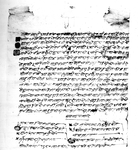A letter from three Bhoṭe brothers agreeing to hand over a bā̃dhā labourer to his master, Chāmbā Khunu (VS 1960)
ID: L_1200_0025
Edited and
translated by Rajendra Shakya
in collaboration with
Rabi Acharya
Created: 2020-05-06;
Last modified: 2022-11-29
For the metadata of the document, click here
The accompanying edition, translation/synopsis and/or commentary are available under the terms of the Creative Commons Attribution-ShareAlike 4.0 International License
Abstract
This agreement states that three Bhoṭe brothers are ready to hand over a bā̃dhā labourer to his owner, Subbā Chāmbā Khunu, and to compensate him for the value of the labour lost within a deadline fixed by him.Diplomatic edition
[1r]
1श्री\[Unknown Seal][Unknown Seal][Unknown Seal][Seal with the inscription: Śrī Rāmacandra 59][Seal with the inscription: Śrī Rāmacandra 59]1लेषितलम्जुं३गाऊमध्येकाण[?]करिक्याल्चैलोप्सांलक्पाछ्रिंभोटेहरु2आगे१८सैषोलामध्येतिडाडावस्न्याछाम्वासुभाकावादाआताभोटेहा
3म्राघरआईमकोसैकोकर्जामधेकोहोईनतीम्राघरमावछुभंन्दाको
4सैकोकर्जामधेकोहोईनभंछंभनेहामी३भाईकोझोपाकोगोठला
5गर्भनीभंदागर्छुतीम्राघरवछुभंदाहामी३भाईकोझोपाकोगोठला
6लाय़ाकोसाँचोहोनीजआताभोटेसुभाछाम्वाषुनुकोवादाषत्हुना
7लेहामी३भाईलाईपालुवजारमामेरावादावुझाईदिंछौंकीकसोभंछौ
8भनीपक्राऊगर्दानीजआताभोटेलाईवुझाऊनप्रनेहुनालेनीजहा
9मीसंगनभैआफ्नावेपारव़ास्तीमाभोट्तर्फगय़ाकोहुनालेनीज
10साहुसंगनीजआताआउनेमात्रमानीस्रजोलागेकोनीम्या
11क्स्मेत्मावीन्तिभाउगरिमानीवुझाऊलाभंदा६०साल्कोकातीक
12मैन्हासम्मभाकादिदामाहामी३भाईकोचीत्तवुझ्योनीजलाईसाहुले
13दिय़ाकोभाकामावुझाऊलालेषियाकोभाकामावुझाय्य़ेनभनेतम्सु
14क्वमोजींकोरुपैञातम्सुक्म्झट्दालाथैलीवुझाऊलातम्सुक्नभैथै
15लीवुझाऊनेछैनभनीहामी३भाईकामनोमानषुसिराजीअन्तना
16म्त्रलेषिनीजसाहुसुभाछाम्वाषुनुकोछोरालाईधोर्जेषुनुलाईदिञुं
17
[table1]
| 1 | सामागाऊकोङवाषुनु | १ | तील्चेवस्न्याडिट्ठादुदुघले | १ |
| 2 | नम्व्रुवस्न्याटसिन्म्गाल्चैषुनु | १ | ऊपल्लोघन्पोषरावस्न्याडिट्ठा वानासुरगुरुं | १ |
| 3 | तील्चेवस्न्यानुर्पुभोटे | १ | ||
| 4 | रुईवस्न्याछरिधवालामा | १ | लेषकामुषिय़ारामचंद्रनेव़ार | १ |
22मीतीसम्वत्१९६०सालमीतीश्रावनसुदि६रोज४शुभ्मं
Translation
[1r]
Written by (likhitam) [the brothers] Kyālcai1 , Lopsāṅ (text: Lopsāṃ) [and] Lhākpā Chiriṅ Bhoṭe (text: Lakpā Chriṃ Bhoṭe), [residents of] …2 from among the three villages of Lamjung (text: Lamjuṃ)
Āge: When Ātā Bhoṭe, a bā̃dhā labourer of SubbāChāmbā, a resident of Tiḍā̃ḍā within the Aṭhāra Saya Kholā region, came to our house and said: "I am not in debt to anyone. I would like to stay in your house," we 3 brothers told him to work in our [cow] barn as a jhopā3 , as he claimed that he was not in debt to anyone. He said: "I'll do so [and] stay at your place", and so it is true that we 3 brothers took him in to work in our barn as a jhopā.
Since the said Ātā Bhoṭe, Subbā Chāmbā Khunu's bā̃dhā, stood accused [of having fled], [and] we 3 brothers were detained [by Subbā Chāmbā] at Pālu Bajāra and questioned: "Will you hand over my bā̃dhā or what do you say?", we had [had no other option than] to hand over the said Ātā Bhoṭe. [However,] the said person was not with us [at that time]. Instead, he had gone to Tibet (text: Bhoṭ) for personal trading purposes. Therefore, after we petitioned the said master (sāhu) regarding the handover of the said Ātā when he returns in person and the nimeka that is owed, we were given a deadline of [the end of] the month of Kārtika of the year [VS 19]60 (1903 CE). This was acceptable to us 3 brothers.
We 3 brothers have therefore willingly and freely written …4 and handed it over to Dhorje Khunu, son of the said master Subbā Chāmbā Khunu, with the following details: "We shall hand over the said person to the master within the given deadline. If we fail to do so, we shall submit a …5 purse with the amount mentioned in the tamasuka. We shall not submit the purse without a tamasuka [drawn]."
Witnesses of this letter:
Ṅavāṅ (text: Ṅavā) Khunu of Sāmāgāũ – 1
Ṭāśī Nāmgyāl Cai Khunu (text: Ṭasi Nmgāl Cai Khunu), resident of Nambru6 – 1
Norbu Bhoṭe (text: Nurpu Bhoṭe), resident of Tilce – 1
Chiriṅ Dhāvā Lāmā (text: Chari Dhavā Lāmā), resident of Rui – 1
ḌiṭṭhāDudu Ghale, resident of Tilce – 1
Ḍiṭṭhā Bānāsura Gurung, resident of Upper Ghanpokharā7 – 1
Scribe MukhiyāRāma Candra Nevāra – 1
Wednesday, the 6th of the bright fortnight of Śrāvaṇa in the [Vikrama] era year 1960 (1903 CE). Auspiciousness.
Commentary
According to the Mulukī Ain, it is a criminal offence to keep someone else's bonded labourer on one's own property. Article 80 of the Mulukī Ain states that if anyone abducted someone else's slave or bonded labourer, or helped him escape, or took him and hid him at his home, or took him somewhere else and hide him, then that person would be made to compensate the master for the value of the lost labour (nimeka) from the day the labourer went missing to the day of his death or escape from the abductor. The abductor was also fined the value attached to the absent labourer and made to return him to his proper owner (Kānuna tathā Nyāya Mantrālaya VS 2022: 349).
Although some of the information in this document is not clear due to the illegibility of a number of letters, it is clear that a bonded labourer, Ātā Bhoṭe, who probably escaped from his master, Chāmbā Khunu in Kutang and travelled all the way to Lamjung, worked as a free man in the cow barn of three Bhoṭe brothers, having lied to them about his status. The master managed to trace him, detain the Bhoṭe brothers and take him back. Ātā's employment by the Bhoṭe brothers in return for being allowed to stay with them was, according to the Mulukī Ain, a criminal offence, and hence the three brothers agreed to hand over the bonded labourer to his master and also pay the nimeka. Unfortunately, this document does not mention the amount of money the labourer was under service for. The Bhoṭe brothers appear to have bargained, and the two sides came to an agreement regarding the (unmentioned) amount to be paid.

